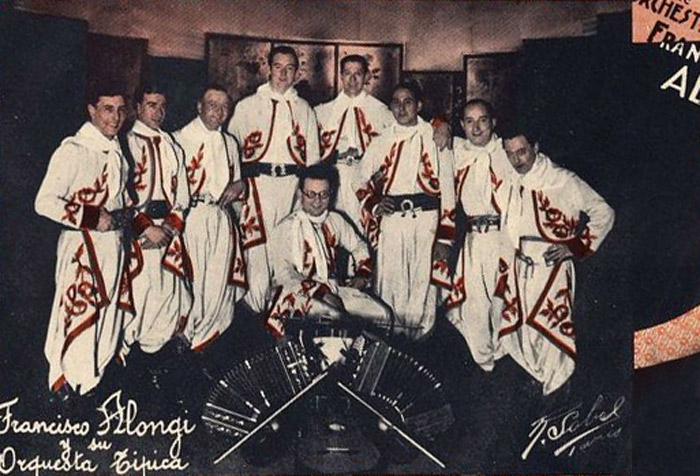
Well-known and less well-known tango orchestras from the late 20s to the late 40s are presented on a total of four albums entitled „Con Saludos desde Europa“. All titles were recorded in Europe. In addition to orchestras based in Europe, there are others who have only toured Europe for a short time. Some of them have been completely forgotten these days. This article provides background information on the orchestras and the musicians of the four albums. This music is also suitable for DJs when putting together tandas on a milonga.
The first album of the small series includes recordings by the orchestras of Quintin Verdu, Jose M. Lucchesi, Francisco Alongi and Rafael Canaro.
Quintin Verdu was born to Spanish parents in Algeria and came to Paris at the age of 10, where he attended the conservatory. At 21, he met Rafael Canaro and Miguel Orlando, who hired him as a pianist. He went on a European tour with Rafael Canaro until 1935 and later accompanied Tino Rossi, whom he soon left to form his own orchestra.
With their distinctive style, they were very successful until the outbreak of war. He was captured and released in 1941. His orchestra later became the house band of the famous “Olympia” in Paris. There are four tracks on this album that present the distinctive style of this orchestra.
José Marcos Lucchesi came to Paris from Brazil as the son of a Corsican family and, following the zeitgeist, also fell in love with the tango in the 1930s. After the war he switched to popular dance music with his works.
Francisco Alongi came to France from Tunisia in 1921 and became a pianist for Manuel Pizarro and later for Tano Genaro. He often accompanied the famous tango singer Rosita Barrios. In 1932 he founded his own orchestra.
Rafael Canaro, the little brother of the great Francisco, was also known as Argentina‘s tango ambassador to Europe. The recordings with Luis Scalon are from 1938 and were taken in Paris. Due to the outbreak of war, Rafael Canaro then returned to his native Argentina.
The second album presents Felice Verrecchia, Manuel and Salvador Pizarro, Rene Pesenti and Auguste Jean Pesenti.
The Argentine Felice Verrecchia Orchestra was a family company that made its first recordings in late 1937. The family originally came from Italy and made a living in the Tango stronghold of Paris. The young singer Bianca Meri later Bianca Verrecchia bewitches by the beauty of her singing.
Manuel Pizarro was one of the pioneers of tango in Europe right from the start. He landed in Marseille for the first time in August 1920 and three months later was a member of the Filipotto ensemble in the cabaret „El Garron“ in Paris. From 1923, he successfully maintained several nightclubs with his brothers Domingo, Salvador, Alfredo, Tanga, Jose and Miguel, which were the starting point for many Argentine tango musicians.
In this album, the only two remaining recordings of Roberto Maida can be heard during his stay in France with Manuel Pizarro.
Little is known about Rene Pesenti and there are only few recordings preserved. The dreamy violins are formative in his arrangements. Auguste Jean Pesenti was also an all-rounder of the night clubs and cabaret industry in Paris. This is shown by numerous recordings with the orchestras of the Parisian „Coliseum“ or the „l‘Empire“. His „Poema“ recording from 1932 is one of the most successful interpretations for me. In 1936 he founded a jazz tango formation for the „Moulin Rouge“ ball.
All recordings have been published by the MKR label, which guarantees the highest sound quality.
(The contribution is an adaptation of a text by Matthias Kroll. Despite careful research, we were unable to identify the photographer of the photo used for this article. We ask possible copyright holders to contact us directly, e.g. by e-mail to This email address is being protected from spambots. You need JavaScript enabled to view it..)